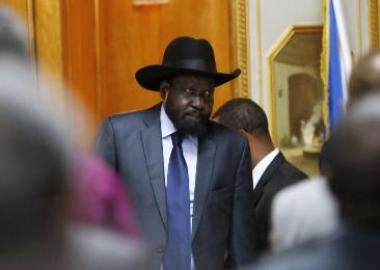South Sudan rebels deny rival leaders held face to face talks
May 10, 2014 (ADDIS ABABA) – South Sudan’s president, Salva Kiir, and his political rival Riek Machar, the former vice president turned rebel leader, did not hold the proposed face to face talks in Addis Ababa in order to reach an agreement to end the almost five-month-old conflict in the country, a rebel spokesperson revealed on Saturday.

Machar’s spokesperson, James Gatdet Dak, told Sudan Tribune on Saturday that the two principals did not hold direct talks as they only responded to the draft agreement prepared by the mediation team who separately consulted with them on the text.
“The two leaders did not hold direct talks. IGAD mediators consulted them separately on the draft agreement. They only met and shook hands during the signing of the roadmap agreement,” Dak said.
During their visits to South Sudan last week, both the United Nations secretary general, Ban Ki Moon, and the US secretary of state, John Kerry, said the two top leaders would hold direct talks in the Ethiopian capital, Addis Ababa, for the first time in order to agree on the way forward.
Another diplomatic source at the venue of the peace talks told Sudan Tribune that the guideline document was not directly negotiated by president Kiir and rebel leader Machar, but was “imposed on the two leaders by the US government which threatened sanctions against any party that would disagree”.
The document calls on the two parties to “immediately cease all hostile activities within 24 hours of the signing of this agreement”.
They also “agree that a transitional government of national unity will offer the best chance for the people of South Sudan to take the country forward; and that such a government shall oversee government functions during a transitional period, implement critical reforms as negotiated through the peace process, oversee a permanent constitution process, and guide the country to new election”.
Dak said the document serves as a roadmap for future negotiations, not only between the two warring parties, but also with inclusion of other South Sudanese stakeholders.
“The two parties with the participation of other South Sudanese stakeholders will continue to negotiate on future governance in the country. A transitional government shall be formed as a product of a negotiated political settlement in order to implement that future agreement,” he further said.
The rebel group has been calling for restructuring of the state based on a political agreement and a federal constitution before formation of a transitional government.
The government however wanted a permanent ceasefire first followed by a power-sharing arrangement with the rebels.
The two parties on 23 January signed an agreement of cessation of hostilities but accused each other of violating the agreement as their forces continued to fight.
Without effective independent monitoring and evaluation system of the two rival forces on the ground, analysts say it may be difficult to respect the ceasefire or determine violators.
(ST)
S. Sudan’s rival SPLM leaders commit themselves to ending war
